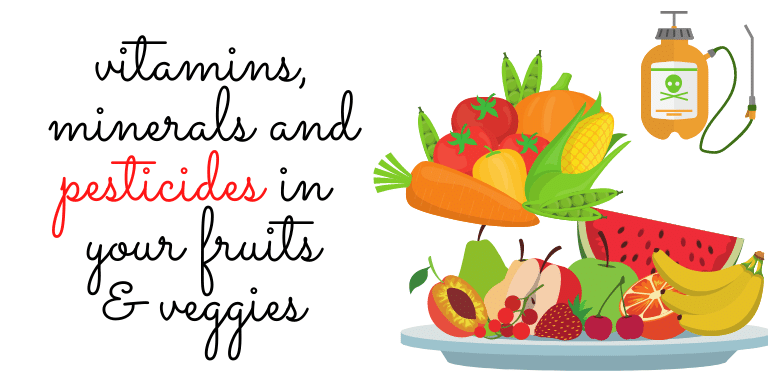Fruits and Vegetables are among the healthiest foods on the planet, they come with vitamins, minerals, and pesticides.
Yes, unfortunately, that’s the harsh reality.
While researching for this article, I found that the books and even Google were not enough.
So, to bring the most authentic information to you I went to different vegetable and food markets.
I discussed this issue with the real people the vendors there, even visited a nearby field, met a few farmers so that we know what really is going on at the grassroots level.
Sadly, almost 99% of the crops are treated with chemical pesticides.
The residue of these pesticides is present on the fruits and vegetables when you buy them in the grocery store.
The most shocking part is that even after washing these fruits and vegetables for continuously 15 seconds in running tap water does not remove the chemical residue.
This is a serious problem of the day and in this article, I’ll share with you the best and the most practical solution to resolve this issue.
So without any further delay let’s get started.
In the past decade or so there has been a tremendous increase in the use of chemical pesticides to meet the needs of the overgrowing population.
Why does India continue to use Lethal pesticide?
Eating fruits and vegetables without properly removing the pesticide residue may lead to food poisoning, diarrhoea, hormonal issues, skin and hair problems and even long-term deadly diseases of brain, kidney, lung, heart, and cancer.
Almost every crop today is treated with chemical pesticides.
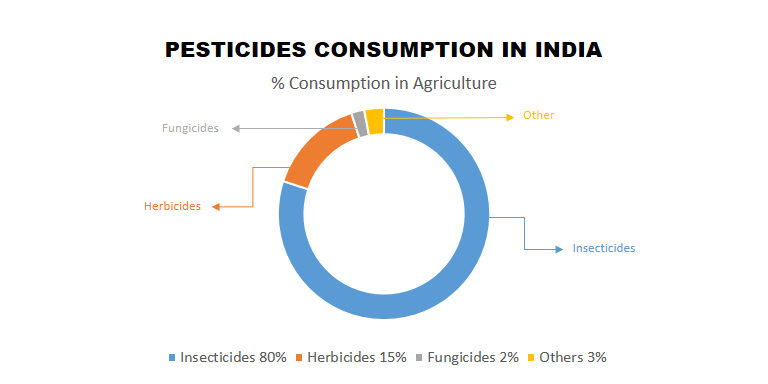
Now, before I come to the solution let me just quickly share with you what and how this is done?
3 Types of Chemical Agents Used in Fruits & Vegetables
So, basically there are three types of chemical agents used on fruits and vegetables to bring out what actually you see at the grocery store.
1. Ripening Agents
First, The Ripening agents: Fruits like banana and mangos are treated with ripening agents mostly calcium carbide.
Calcium carbide reacts with moisture to form Acetylene which mimics natural ripener, Ethylene.
Obviously, this is done so that fruits and vegetables reach the market before the season and can fetch more profit.
The problem with industrial calcium carbide is that it contains heavy metals like lead and arsenic which are dangerous for the human body.
2. Coating Agents
Secondly, Coating agents like Wax & DPA (Diphenylamine) are used mostly on fruits like apples. grapes and almost every exotic fruits which travel the seven seas to reach your doorstep.
The purpose of doing this (using Coating agents) is to preserve the moisture and the consistency of the during cold storage and transportation so that they look fresh on the shelf.
Have you noticed a white powder sprinkled mostly on red and black grapes? It is a chemical agent to prevent the grapes from getting soggy.
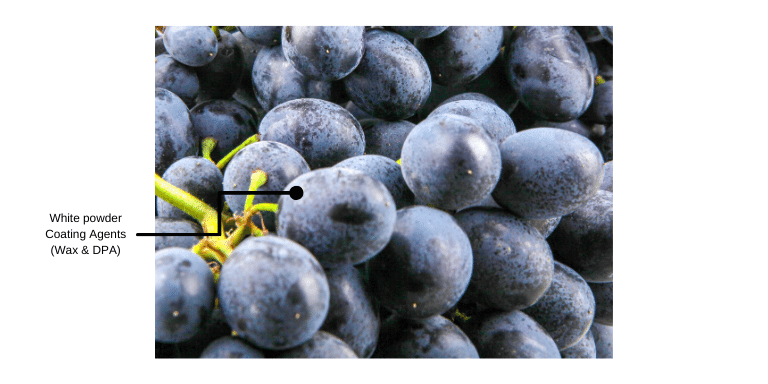
Wax is a petroleum product while DPA reacts with nitrogen in the air to form nitrosamine which is a suspected carcinogen (cancer-causing).
The Solution of Above Two Problems
See the solution to these two problems is very obvious.
1. First, never eat fruits and vegetables which are not in season
2. Secondly, ditch all the foreign exotic fruits and vegetables and switch to local produce.
This way not only you will save yourself from these chemicals but also the foods you will buy will be cheaper, more easily absorbed by your body and not forget doing this you will be helping the local farmers and in turn the Indian economy.
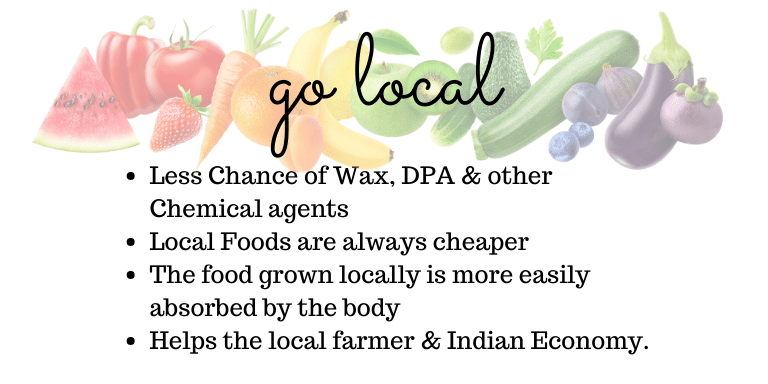
3. Pesticides
Now coming to third chemical agents which are worst of all are The PESTICIDES. Mainly there are two types of Pesticides:
– Systematic Pesticides
There are systemic pesticides which are put in the bottom of the tree nearer to the roots so that they are absorbed by the plant and they will be in the leaves, stems, fruits, flowers for about 10 to 15 weeks.
– Contact Pesticides
Then there are contact pesticides which are sprayed on the surface of the plant fruits and vegetables.
These are the main culprits as the residue of these pesticides remain on the fruits and vegetables even after you bring them to your home.
SOLUTION FROM PESTICIDES
We can get rid of these toxic pesticides. Now the most obvious solution is to buy organic food.
Although it’s not that organic foods are not treated with pesticides it’s just that they use safer alternatives.
However, considering the soaring prices of organic foods it might not be a practical solution for many of us.
Effective & Very Simple Way to Remove Pesticides
Let me share with you a very simple way which has been proven to remove almost 98% of pesticide residue. Yes.
All you need to do is – Put the contaminated fruits and vegetables in one place in a container and pour enough water in it.
Now put one tablespoon of baking soda in it. Baking soda is easily available in grocery shops.
I have even linked it down below.
NutroActive Baking Soda – https://amzn.to/3h2zEc1
Now leave the container for about 15 to 20 minutes.
Now wash them thoroughly with running tap water.
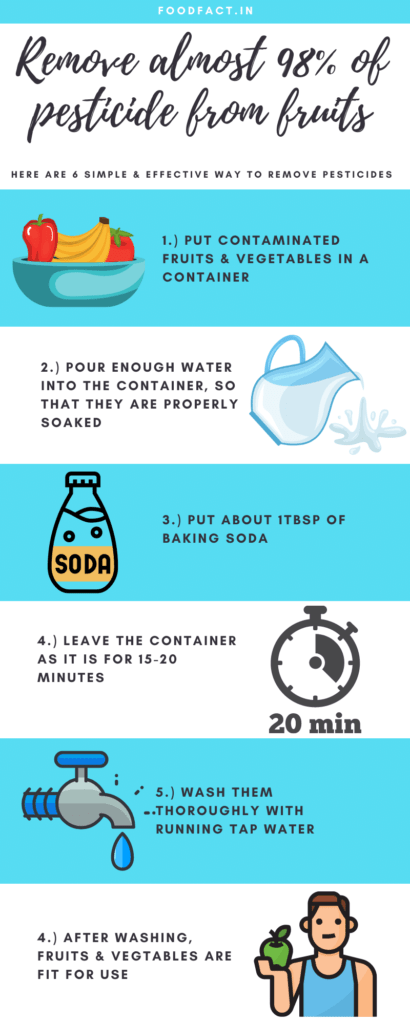
Baking soda that is sodium bicarbonate known for his alkalizing nature helps remove almost 98% of the pesticide residue from fruits and vegetables. Studies have proven this.
This is an easy yet very effective way of removing pesticides from fruits and vegetables.
So, next time and every time you buy fruits and vegetables make them go through this process.
GENERAL TIPS
There are some more tricks which help you minimize the effect of pesticides.
1. Peel Off Layered fruits or Vegetables
For Example – Whenever you want to wash something like cabbage or onions always make it a habit to peel off the first layer then wash them in a baking soda solution.
2. Wash Before You Peel
Then if a fruit or vegetable has skin which you won’t be using even then do not shy away from washing it with baking soda.
3. Wash Before You Cut
For example – When you cut an unwashed muskmelon some part of the pesticide residue from the surface goes inside.
4. Keep The Lid Open While Cooking
Next in order to diminish the effect of systemic pesticides, it is recommended to keep the lid open while cooking the vegetables.
The agricultural scientists say that with steam, pesticides inside and outside the body of vegetables move upwards.
Well, it can’t be said that using all these practices we can make our fruits and vegetables 100% free of pesticides.
But there is no doubt about the fact that these are highly effective methods to reduce the effect of pesticides and other chemical agents to as much as possible.
And frankly, this is the best we can do as a smart consumer.
After talking with local vendors and farmers I came to know that there are certain fruits and vegetables which are heavily treated with chemicals.
As the Winter season is approaching be ready for chemically ripen oranges, apples in the beginning.
Bananas are extensively treated with calcium carbide to meet the demands.
One easy way to differentiate is that naturally ripened bananas have black or brown stalk & black spots.
Whereas chemically ripen bananas have a green stalk.
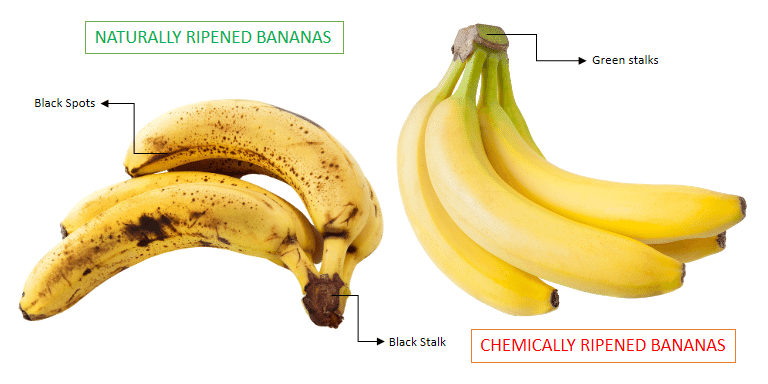
Tomatoes are very heavily treated with pesticides.
Other heavily treated fruits and vegetables include grapes, papaya, brinjal, etc.
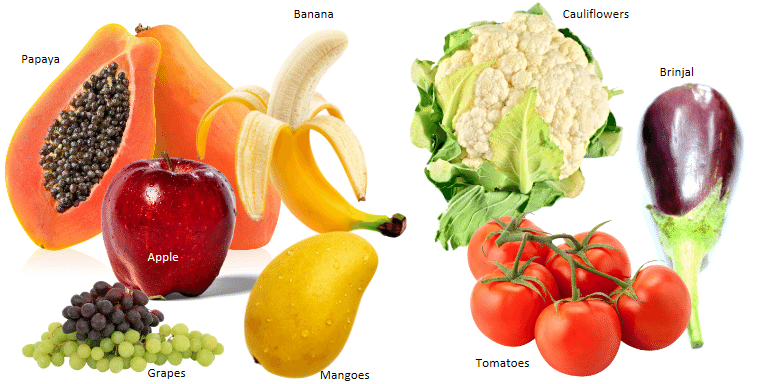
Then I also got to know that there are vegetables which require the least amount of pesticides.
These include mostly the ones which are grown underground like onions, potatoes, sweet potatoes, carrots, reddish etc.
Even green leafy vegetables do not require a lot of pesticides. So you have another reason to eat them more often.
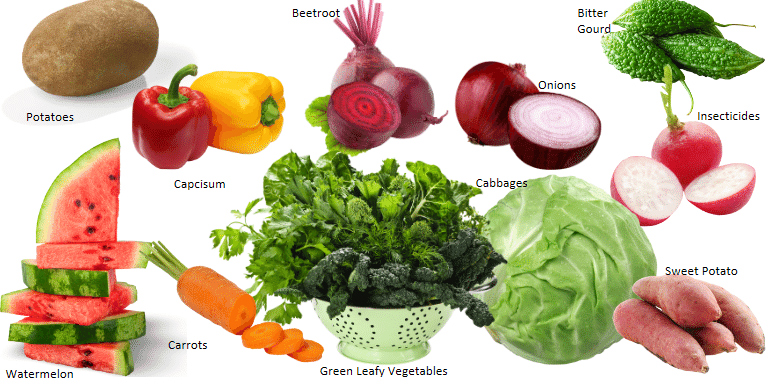
This was just for your awareness, although I would still highly recommend you to wash all the fruits and vegetables that you buy in a baking soda solution.
Even a small residue of pesticide (1mg of pesticide residue a day = 365mg deposited in a year), our body finds it very difficult to get rid of and it gets deposited in the adipose tissue.
Now here’s something interesting to know, since most pesticides used are lipophilic pesticides dissolving in oily surfaces, that’s where ancient ayurvedic techniques like oil pulling are really helpful.
SUMMARY
So, what’s the takeaway from this article?
- Avoid fruits and vegetables which are not in season.
- Ditch the foreign exotic foods and switch to local produce.
- Always wash the fruits and vegetables with baking soda solution remove the first layer of foods like cabbage and onion before washing.
- Keeping the lid open while cooking helps minimize the effect of pesticides.
- Some foods are heavily treated while others are not, choose wisely.
- Buy organic foods whenever possible.
- Start oil pulling to get the deposited toxins out from the body.
As a smart consumer let’s be aware and do as best as we can. Like switching to organic food products is a better option.
So, friends, that’s all. Did you find it to be helpful?
If yes then please share this blog. Also do not forget to share your opinions below in the comment section.
Thank you so much for reading.
